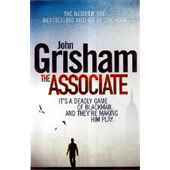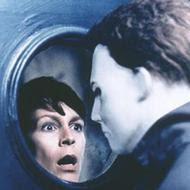 When the Thomas Harris book Hannibal came out in 1999, I was very keen to read it.
When the Thomas Harris book Hannibal came out in 1999, I was very keen to read it.
I’d enjoyed Red Dragon and The Silence Of The Lambs – even if they were essentially the same story twice (representative of the FBI reluctantly goes to imprisoned serial killer Hannibal Lecter for insight into a current case), they were solid crime thrillers with a good sense of being a race against time, to stop a killer.
In Hannibal, on the other hand, Lecter has escaped, which removes the ticking clock element, and instead of the reality-based investigation, the tone of the book is more one of gothic melodrama, with an ending that left me speechless in the worst possible way (working from memory: Lecter digs up Clarice Starling’s dead dad, drugs her and confronts her with the corpse, and after a bit of her boss’s brains being eaten, she and Lecter become lovers). It was like I’d recorded LA Confidential and found that someone had taped Friday the 13th over the last third of it. Very disappointing. But I guess these things happen.
More strangely, though, there seemed to be a lot of very positive reviews of the book when it come out (as evinced here), often using words such as grand guignol, but hardly ever referring to the ending and making me suspect that they hadn’t actually read it all the way through before getting their reviews in. Anyway, it certainly made me less trustful of reviews, and blurbs and publicity material (I know, it’s appalling that I was 28 before that truth hit home; I like to think of it as a charming kind of naivete, but history will be the judge).
 A very similar thing happened to me yesterday in relation to the new John Grisham paperback, The Associate; I used to like Grisham’s stuff a lot, though the further I went through the world of legal academia the less I enjoyed them, until I just stopped reading them.
A very similar thing happened to me yesterday in relation to the new John Grisham paperback, The Associate; I used to like Grisham’s stuff a lot, though the further I went through the world of legal academia the less I enjoyed them, until I just stopped reading them.
But The Associate sounded more like The Firm, with its storyline about a newly-qualified lawyer in trouble, and I wondered if this might be a fun read. The print reviews certainly seem to suggest so – look at this gallery of praise taken from the Amazon page for the book:
It’s a damned good read. This is Grisham returning to what he knows best.
Scotland on Sunday
Grisham paints a fascinating picture. Vintage Grisham, with a really believable ending
The Guardian
Tense and exciting
Evening Standard
The suspense is there in what is easily his most recognisably ‘back to form’ novel since The Firm. Grisham has returned with a vengeance to his trademark territory: the grim world of corporate law and the sinister machinations of the men on its fringes.
The Times
In typical Grisham fashion it does hurtle along at a decent clip
London Lite
Don’t wait for the film read the book first this time. The maestro of the legal thriller’s new one centres on a brilliant student with an unfortunate secret.
Daily Sport
A classic Grisham plot, similar to his first major success, The Firm, and told with the same elegance and elan.
The Daily Mail
Grisham never disappoints and this is another fantastic read
The Sun
In The Associate, John Grisham returns to the legal milieu he explored so vividly in The Firm. Grisham is such a storyteller that you want to turn the page
The Guardian
Grisham’s new book harks back to the one that made him famous, and effectively defined the legal thriller genre: The Firm. Grisham does a fine job of evoking the insanely competitive culture of a major New York law firm.
The Mail on Sunday
… so, lots of praise there, and many of them referring to the book of his which I’d enjoyed so much, which made me feel it could be one for me… until I went onto the Amazon page and saw that the vast majority of the reviews were negative, and repeatedly spoke about one particular failing: the story just ends without resolving anything.
Seriously, check out the customer reviews; over and over again, people say how much they were enjoying the book, wondering where the story was going and how he was going to tie up the loose ends, and over and over they say that he doesn’t, that the book just ends.
And so I don’t think this is a book I’ll be buying (probably for the best, I have a sizey book-queue already), but I find myself remembering the Hannibal experience and starting to wonder how it is that professional reviewers can overlook something so fundamental as a letdown, or an absent, ending.
I’m very keen on stories that reward you for time expended on reading them by showing that, yes, we were going somewhere all along (and even better if the seeds of the end were planted near the start – as in The Shining), and whilst that’d kind of a personal preference, the concept that ‘stories should have a beginning, middle and end’ is a fairly well-known one, and you’d expect that most reviews would refer to a weak or rubbish ending (as Marie did in this review on Wednesday).
Deadline problems aside, is there a good reason why this sort of thing happens? Is it seem as in some way gauche to address such fundamental elements of a novel?
And of course, the alleged absence of a climax certainly makes the Guardian quote (second in the list above) look pretty strange – unless they’re making the point that sometimes life just carries on without tricky situations being resolved, but that seems an odd thing to do in a thriller.
 Michael’s bid to become a professional photographer floundered; not only did he insist on framing the shot like a scene from the 1960s Batman TV show, but he pointed the camera towards himself instead of the subject.
Michael’s bid to become a professional photographer floundered; not only did he insist on framing the shot like a scene from the 1960s Batman TV show, but he pointed the camera towards himself instead of the subject.







